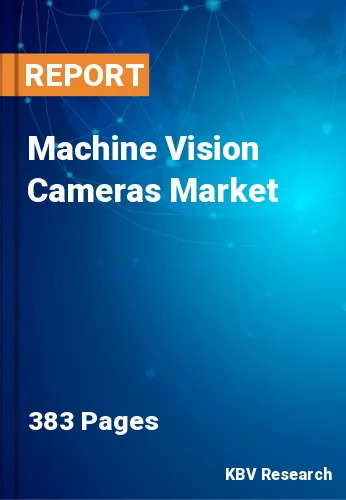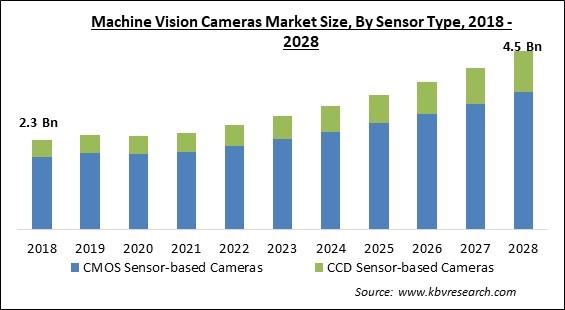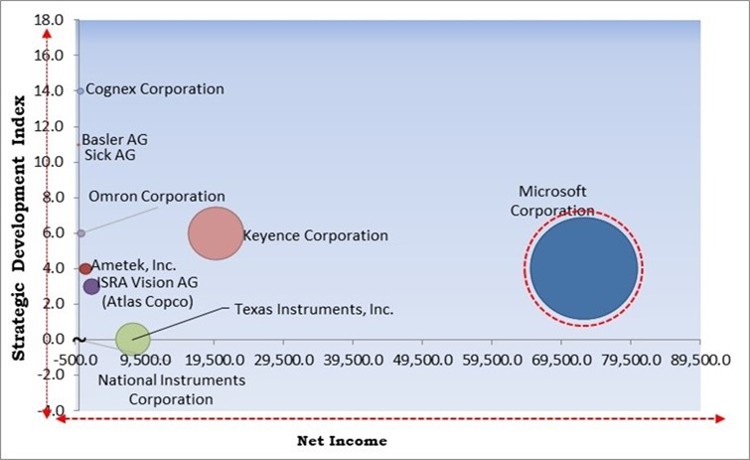
The Global Machine Vision Cameras Market size is expected to reach $4.5 billion by 2028, rising at a market growth of 9.3% CAGR during the forecast period.
The eyes of visual quality inspection systems are machine vision cameras. Cameras and machine vision technologies enhance performance by automating processes, accelerating their speed and throughput, and improving their precision, predictability, and repeatability.

Continuous quality assessments, which enable the rejection of faults and the discovery of process deviation, are also made feasible by camera-based inspection. For quality control applications, machine vision systems and cameras can be especially effective at various tasks, such as gauging, directing, identifying, and inspecting.
Machine vision cameras also enable a level of automation, reliability, consistency, and accuracy that is always present and goes beyond the range of human perception. Robots also often use Meraki cameras and Meraki MV2, which are ideal for jobs that are challenging, dangerous, or tiresome for human workers.
For various imaging applications, including machine vision or machine automation, cameras take pictures of the studied items or locations. Imaging lenses interact with cameras, which are imaging components.
They have sensors to capture images of the light that the imaging lenses concentrate on. Many different image sensor formats, like CCD or CMOS sensors, are used in constructing cameras and are appropriate for every imaging application. They are extensively utilized in microscopy, object flow management, and production control.
The market was primarily affected by several challenges, including a shortage of experienced laborers and project delays or cancellations resulting from partial or total lockdowns worldwide. Additionally, the global machine vision camera market is becoming stronger post-COVID-19 due to the spike in demand for machines in non-industrial sectors. However, it's anticipated that COVID-19's detrimental effects on the market for machine vision cameras will only last a short while. On the other hand, a strong rebound is projected for the market by late 2022 due to the high demand for consumer electronics. Additionally, it is anticipated that the current pandemic will increase demand for machine vision camera systems and services, opening up the potential for market expansion.
The market for 3D imaging has grown to be a mature and strong component of machine vision, with both new and updated systems and components for vital advanced automation activities like metrology, inspection, and guidance. With improvements in this form of imaging's dependability, accuracy, and usability, use cases are growing. These and other factors are fueling the market for machine vision cameras.
3D Machine Vision Cameras are used in various industrial applications. For example, the pharmaceutical business uses vision technology to inspect the production process and product quality using the presence and absence principle. Blister pack inspection using a 3D machine vision camera system is also possible for reading labels, and identifying half-tablets, missing tablets, damaged tablets, and tablet colours. The light is activated by the pack moving along the conveyor, and the camera which takes pictures of the pack and any flaws causes the pack to be automatically removed from the production line. The need for machine vision cameras is increasing due to the growing use of machine vision in manufacturing.
Robotic vision technology is evolving quickly, with new innovations appearing regularly and new solutions coming on the market very quickly to help solve automation issues easier. The robotic vision market has witnessed the development of more improved sensors in the last ten years, including larger and smaller sensors with smaller pixels, more accurate software platforms, and illumination that is getting brighter and more effective. Because vision systems are not made for industrial use, this detrimental impact the market for machine vision cameras.
Based on end user, the Machine Vision Cameras Market is classified into Automotive, Healthcare, Manufacturing & Packaging, Industrial, and Others. During 2021, the healthcare segment significantly increased its revenue share in the market. Machine vision camera makers build their products to be strong and long-lasting enough for use in medical imaging. Machine vision cameras are made to offer superior stability and repeatability of imaging data in comparison to consumer digital cameras. Digital solid imaging tools can provide a detailed disease image and help with an earlier diagnosis.

Based on vision type, the Machine Vision Cameras Market is classified into 3D Vision, 2D Vision, and 1D Vision. Regarding revenue share, 2D vision is leading the market in 2021. Digital cameras were utilized in 2D machine vision to take pictures of objects. A two-dimensional (X, Y) map of the reflected intensity is recorded and analyzed using 2D machine vision. Usually, processing involves comparing intensity fluctuations (contrast).
Based on sensor type, the Machine Vision Cameras Market is classified into CMOS Sensor-based cameras and CCD Sensor-based cameras. The CCD Sensors are expected to have the substantial revenue share in 2021. Cheap CCD sensors are available. They benefit from having an excellent price/quality ratio. However, its inspection spectrum is only sensitive to visible things. They also have the drawback of having a lot of parasitic electrons that dramatically increase with temperature and are extremely glare-sensitive.
Based on platform type, the Machine Vision Cameras Market is classified into Smart Camera, PC based Camera, Wireless Camera, and Wearable Cameras. The market segment with the significant revenue share in 2021 was smart cameras. A machine vision system known as a smart camera (sensor), intelligent camera (sensor), smart vision (sensor), smart optical (sensor), smart optical (sensor), smart visual (sensor), or smart visual (sensor) is capable of extracting application-specific information from the captured images, as well as creating event descriptions or deciding that are utilized in an intelligent and automated manner.
Based on camera type, the Machine Vision Cameras Market is divided into Line Scan, Area Scan, and 3D Scan cameras. Area Scan will have a significant revenue share in 2021. The majority of applications employ area scan cameras for image acquisition. One exposure cycle can provide a typical two-dimensional image because of the camera's sensor's vast matrix of image pixels. Different detector characteristics, such as technical elements like various sensitivity, image refresh rates, pixel sizes, selection and trigger modes, noise behavior, etc., can be employed for area scan cameras depending on the sensor used.
Based on Application, the Machine Vision Cameras Market is divided into the categories of Quality Assurance & Inspection, Position Guidance, Measurement, Identification, and Others. The identification segment demonstrated the market's significant sales shared in 2021. A machine vision camera for part identification and recognition can read letters printed on parts, labels, and packages in addition to barcodes (1-D), data matrix codes (2-D), direct part marks (DPM), and barcodes. While an optical character verification (OCV) system verifies the existence of a character string, an optical character recognition (OCR) system recognizes alphanumeric characters with no prior information.
| Report Attribute | Details |
|---|---|
| Market size value in 2021 | USD 2.4 Billion |
| Market size forecast in 2028 | USD 4.5 Billion |
| Base Year | 2021 |
| Historical Period | 2018 to 2020 |
| Forecast Period | 2022 to 2028 |
| Revenue Growth Rate | CAGR of 9.3% from 2022 to 2028 |
| Number of Pages | 383 |
| Number of Tables | 653 |
| Report coverage | Market Trends, Revenue Estimation and Forecast, Segmentation Analysis, Regional and Country Breakdown, Competitive Landscape, Companies Strategic Developments, Company Profiling |
| Segments covered | Sensor Type, Application, Platform Type, Vision Type, Camera Type, End User, Region |
| Country scope | US, Canada, Mexico, Germany, UK, France, Russia, Spain, Italy, China, Japan, India, South Korea, Singapore, Malaysia, Brazil, Argentina, UAE, Saudi Arabia, South Africa, Nigeria |
| Growth Drivers |
|
| Restraints |
|
Based on region, the Machine Vision Cameras Market is segmented into North America, Europe, Asia Pacific, and LAMEA. Asia Pacific region emerged as a largest region in the Machine Vision Cameras market due to the growing demand for consumer electronics products and swift development in the medical & life sciences industry in this region. Additionally, Asia-Pacific is anticipated to record a substantial growth rate over the forecast period. With the availability of low-cost labor and the presence of various manufacturing facilities by several global companies like Toshiba Corporation, Samsung Electronics, Xiaomi Corporation, Taiwan Semiconductor Manufacturing, Sony Corporation, and Panasonic Corporation, the organic CMOS image sensor market would improve the productivity in this region.
Free Valuable Insights: Global Machine Vision Cameras Market size to reach USD 4.5 Billion by 2028

The major strategies followed by the market participants are Product Launches. Based on the Analysis presented in the Cardinal matrix; Microsoft Corporation is the forerunner in the Machine Vision Cameras Market. Companies such as Keyence Corporation, Cognex Corporation, Texas Instruments, Inc. are some of the key innovators in Machine Vision Cameras Market.
The market research report covers the analysis of key stake holders of the market. Key companies profiled in the report include ISRA Vision AG (Atlas Copco), Sick AG, Microsoft Corporation, Ametek, Inc., Cognex Corporation, Basler AG, Omron Corporation, Keyence Corporation, National Instruments Corporation, and Texas Instruments, Inc.
By End User
By Sensor Type
By Application
By Platform Type
By Vision Type
By Camera Type
By Geography
The global Machine Vision Cameras Market size is expected to reach $4.5 billion by 2028.
Emergence Of Many New Technologies are driving the market in coming years, however, Users' Lack Of Knowledge And System Stability restraints the growth of the market.
ISRA Vision AG (Atlas Copco), Sick AG, Microsoft Corporation, Ametek, Inc., Cognex Corporation, Basler AG, Omron Corporation, Keyence Corporation, National Instruments Corporation, and Texas Instruments, Inc.
The CMOS Sensor-based Cameras segment acquired maximum revenue share in the Global Machine Vision Cameras Market by Sensor Type in 2021 thereby, achieving a market value of $3.5 billion by 2028.
The Line Scan segment is leading the Global Machine Vision Cameras Market by Camera Type in 2021 thereby, achieving a market value of $2.1 billion by 2028.
The Asia Pacific market dominated the Global Machine Vision Cameras Market by Region in 2021, and would continue to be a dominant market till 2028; thereby, achieving a market value of $1.6 billion by 2028.
Our team of dedicated experts can provide you with attractive expansion opportunities for your business.
